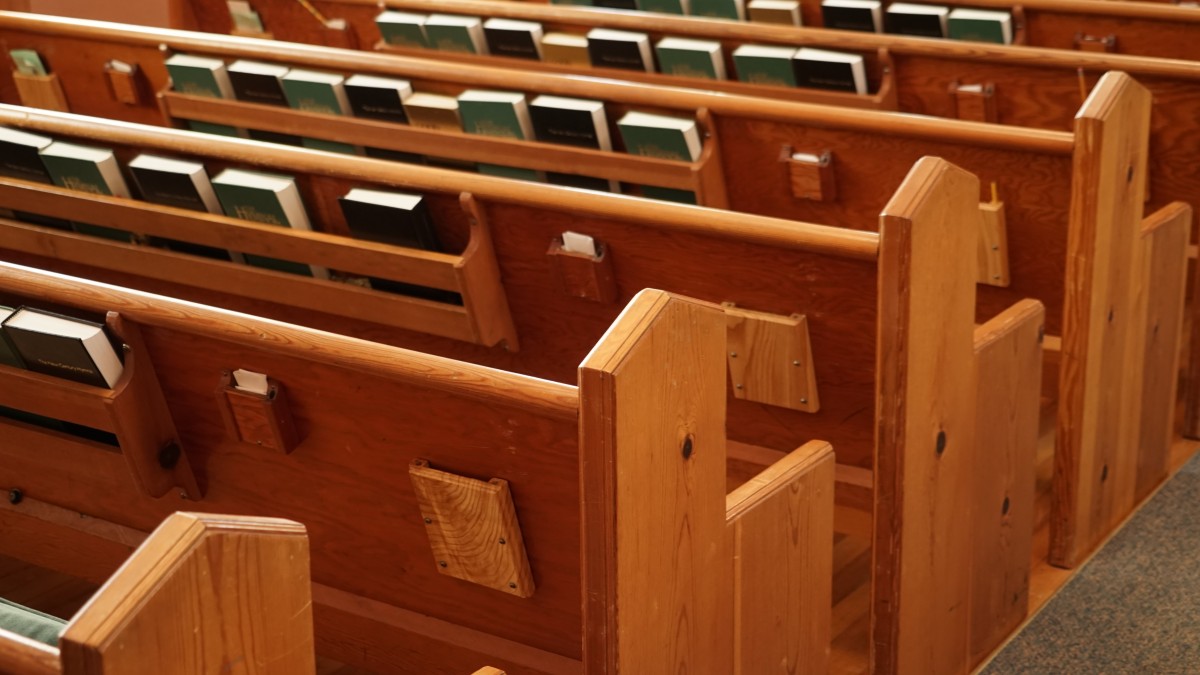Blog
Bearing a Different Gospel Beautifully
Monday, September 06, 2021
The apostle Paul was fond of sarcasm, not because he didn’t love people, but because he did. When Christians he had converted turned aside from Christ, it drove him to distraction, and that distraction often found its expression in heartfelt exasperation.
One such expression appears in 2 Corinthians 11:4. In contrast to the stubborn resistance the Corinthians put up to Paul’s teaching, they listened eagerly to the false teachers who followed him. Paul tells them that they bore a different gospel beautifully, implying that the attention they devoted to the workers of deceit was the attention they should have devoted to him.
Today, there are far too many Christians who bear a different gospel beautifully, and it is entirely understandable that they should do so. In the sense of 1 Corinthians 2:14, the gospel is unnatural. It does two things in particular that humans don’t like. It demands that we do hard things ourselves, and it keeps us from adopting easy workarounds. When a different gospel diminishes the former and permits the latter, we tend to bear it beautifully.
To see how this works, let’s pick a simple example: hospitality. The Bible commands us to be hospitable, a sacred tradition that stretches back to the days of Abraham if not earlier. Hebrews 13:2 tells us that we should follow Abraham’s example because he entertained angels without knowing it. This refers, I think, not only to the possibility of supernatural visitors but also to the impact that hospitality can have both on others and on us.
Hospitality reveals the generosity and kindness of Christ. As we practice hospitality, we become more like Him. It surely is a part of walking in a manner worthy of the gospel!
However, there’s a problem. Hospitality is hard. It goes against the grain of our culture. Either we invest a lot of time in cleaning up and preparing a nice meal, or we expose our messy fast-food reality. We might even have to invite over a rampaging mob of church kids. Not surprisingly, many modern-day Christians struggle to show hospitality.
There are two solutions to this problem. Either we do better at hospitality ourselves (still hard), or we outsource hospitality to the church. The latter is much more appealing. Sustaining that fellowship hall at the church building will cost some money, but we have more money than time. We drop a check in the plate, and we never have to open our home to anybody again.
As elegant as this solution seems, there are issues with it. First, it’s different. First-century Christians were in the hospitality business, but the first-century church wasn’t. Second, the fellowship halls, gyms, and so forth might produce hospitality of a sort, but they don’t produce a congregation of hospitable Christians. Anything that subverts the gospel goal of godliness is hostile to it.
Walking in the ancient paths is difficult and frustrating. We are inclined to Americanize our faith by departing from it in ways that seem good to the wisdom of our time. Consequently, the words of the agents of change often fall on receptive ears.
However, we do better to consider the wisdom of the One who laid out those ancient paths in the first place. His ways are not our ways, and He always has reasons for His commandments and His silence, even if those reasons are not apparent to us. Rather than bearing a different gospel, we should strive instead to bear our cross.
A Gouge in a Pew
Friday, September 03, 2021
A couple of weeks ago, I attended a friend’s funeral in an unfamiliar church building. I took a seat by an aisle and shortly noticed a gouge in the back of the pew support in front of me. The gouge was at knee height. To the left/exterior, it was narrow and shallow; to the right/interior, it broadened and deepened to about a quarter inch. Another, fainter horizontal scrape appeared two or three inches above it. None of the other pews around me bore similar markings.
I will never know for sure, but I would guess that the scrapes came from a walker or similar piece of assistive equipment. An older Christian once sat (has sat?) there for years because that was Their Pew. They shuffled into the auditorium on their walker, gingerly lowered themselves to the seat where I sat, folded up their walker, and dragged it into the same row.
As they were doing so, their lack of stability forced them to brace the walker against the pew in front of them. Every time, something (a walker brace? screw heads?) raked across the pew support. Service by service, year by year, those feeble hands wore away the gouge that I saw. That Christian may well be dead now, but the gouge still bears witness. They assembled.
Sometimes, it is the faith we display in our weaknesses that makes the deepest mark. Lots of strong, healthy Christians strode into that auditorium, worshiped, and departed without leaving a trace. However, the pew support remembers the Christian who probably couldn’t drive to church anymore, who couldn’t walk unassisted, whose pace was slow and even doddering. They certainly inspired pity, perhaps contempt, perhaps frustration from the custodial crew, but they came. No one would have faulted them for not coming. They came anyway, and the pew support testifies to their faithful obedience.
So too with the marks we make, and not only on pews. Some of the Christians whose singing I remember most are those who couldn’t carry a tune in a bucket. They knew it and sang anyway. Loudly. They were humbled, but God was exalted.
How about the introvert who, with white knuckles and sweaty palms, welcomes a visitor to the assembly? Or the octogenarian who shows up to help a relocated brother unload the moving truck? Or the song leader who can’t read a note of music but listens to a new hymn over and over on YouTube until he feels comfortable introducing it to the congregation?
How about the apostle Paul, who struggled with covetousness but learned from Christ the secret of remaining faithful through poverty and prosperity alike?
We often seek to glorify God through our strengths. This is our wheelhouse. This is the thing we are good at. Look at this wonderful thing we are doing (for God)!
Perhaps, though, He is best glorified through our weaknesses. This is not our wheelhouse. We are terrified. We are a hopeless disaster. We would not be doing this for anybody but God, but He told us to do it, and we are.
The ungodly might be laughing at us, but God isn’t laughing. He is pleased. He loves not only the sacrifices that arise from effortless self-confidence but also those offered in weakness, fear, and trembling. Against all worldly wisdom, we surrender our two mites, knowing it can’t possibly matter but trusting that it will be enough.
Godly Living in an Ungodly World
Tuesday, August 31, 2021
The older you get, the better able you are to see the changes around you. I find that this is increasingly true for me, even though I’m only middle-aged. I remember what it was like to be alive in the 1980s and 1990s, and when I look around now, I see that things are very different.
These differences are perhaps most striking when it comes to the moral decline of our society. Sins that I didn’t even know existed when I still was in high school now are openly promoted and celebrated. For the first time in many years, most Americans are not associated with some house of worship, whether church, synagogue, or mosque.
Though this new world may be unfamiliar territory for us, it is not foreign to the experience of the people of God. In fact, the climate of the first century was much like the climate of our time. Most people back then were ungodly and immoral too. As a result, Scriptures that may not have mattered much before now are increasingly relevant. This morning, let’s look at one such context from 1 Peter to see how we can live godly in an ungodly world.
In this context, Peter gives three basic commands to Christians. The first of these is to ABSTAIN. Let’s read from 1 Peter 2:11-12. Here, we see Peter’s famous admonition to abstain from fleshly lusts. It’s tempting to read this as being about sexual desire only, but I think we need to read it more broadly than that. We need to watch out not only for thoughts that are impure, but also for thoughts that are bitter, contemptuous, greedy, and self-righteous. If it wasn’t in the Lord’s heart, it doesn’t belong in our heart either.
Next, we need to consider Peter’s call to excellent behavior. Notice, though, that he has a particular kind of excellent behavior in mind. It’s excellent behavior in the areas where the people of the world slander us. In other words, in order to apply this passage, we must listen to our enemies.
What kind of things do they say about us? They say we’re judgmental and vicious. They say we care more about politics than we do about Jesus. They say that we hypocritically condemn sin in our political enemies while overlooking it in our political friends. They say that we covertly support white supremacy and don’t care about the plight of black and brown people. Make no mistake, brethren! There are people who used to worship here who never will return because they believe these things about us.
It’s tempting to fire back when we hear things like this, but that’s not what Peter urges us to do. Christians don’t reply to slander with angry rebuttals. We reply to slander with good deeds. We use our lives to show Christ even to our enemies.
This means that today, we must be people who are quick to show mercy because we have received mercy. We must spend more time with the Bible than we do with cable news. We must apply the standards of the Bible to everyone without partiality. We must prove by the way we treat others that we care about everyone with a soul. On the other hand, if we aren’t willing to do these things, we reveal to others that maybe those slanders aren’t slanders after all.
Second, we must SUBMIT. Consider Peter’s words in 1 Peter 2:13-16. As always, it’s worth noting that our political system is very different than that of the Roman Empire. Christians then had zero influence in selecting their political leaders, but today, we can vote and even advocate for the candidates we believe are best. There’s no sin in doing any of those things.
However, when the election is over, our role is clear. We are to submit to the government, whether our candidates got in or not. We don’t have to agree with the decisions the government hands down, but we have to obey them anyway. The only exception, of course, is when the laws of the government require us to disobey the law of God.
Interestingly, though, Peter’s reasoning here is different than Paul’s in Romans 13. Rather than being concerned with submission to God, Peter tells us to submit in order to silence the ignorance of the foolish. Here again, this has a strangely modern ring. Aren’t people right now slandering Christians because they claim we won’t submit to the government? Once again, our response is clear. We silence them by doing right.
Finally in this section, let’s consider Peter’s warning against using freedom as a covering from evil. For the past year and a half, I’ve shied away from talking about vaccines and masks, but this is a place where I believe I would not be honest with the text if I didn’t discuss those contentious issues.
In recent days, I’ve heard a lot from Christians about their freedom to refuse masks and vaccines. As long as earthly authorities like governments and employers allow us that liberty too, there’s no Biblical issue with that. However, when those governments and employers start mandating masks and vaccinations, we must use our freedom to submit. If we insist on being free from those things instead, that’s not heroism. It’s ungodliness.
I’ve heard Christians say that their conscience does not allow them to mask or vaccinate, so the obeying-God exception applies. The problem is, though, that our conscience is not equal to the commandment of God, and there is no divine commandment about masks or vaccines. Obeying God by submitting is the right thing to do, and if our conscience says otherwise, we have to squash it.
Lastly, we must HONOR. Look at 1 Peter 2:17. The first thing for us to notice here is our responsibility for honoring the king. As I said earlier, it’s lawful for Christians to participate in political discourse and advocacy, but when we are participating, we must participate in godly ways.
Unsurprisingly, the way the world does politics is ungodly. Commonly, we see political partisans attacking elected officials with sarcasm, slander, and lies. Every mistake is an occasion for mockery. Every policy decision is an opportunity for misrepresentation and distortion.
Because this bad behavior is so common, it’s easy for us to conclude that it’s acceptable. It isn’t. We are free to express disagreement, even strong disagreement, with our nation’s leaders, but we always must do so in a respectful way that honors them and honors God. When we adopt worldly words to express our contempt and amuse our friends, we dishonor the name by which we have been called.
Note also that the king isn’t the only one we are supposed to honor. Indeed, Peter says we are supposed to honor everyone. We are supposed to speak to everyone and about everyone with courtesy and respect, always.
This is hard! As you know, I have a snarky sense of humor, and when somebody irritates me, I want to react by turning that snark on them. It’s satisfying in the moment, but it also makes me blend right in with the snarky, meanspirited world. If we want to stand out instead, if we want to shine as lights in the world, we do that by taking the high road. When we are kind and respectful, even when others would not be, we show others the value that God places on everyone.
Finishing What We Start
Monday, August 30, 2021
All of 2 Corinthians 8-9 is taken up with Paul’s discussion of the collection for the needy saints in Jerusalem. Paul envisions this collection as an opportunity to bridge the gap between Jewish and Gentile churches, so these two chapters contain a host of reasons why the Corinthians should contribute. Many of these are specific to the subject of generosity and material things, but some are not. In particular, Paul points out in 2 Corinthians 8:10-12 that the Christians there already had promised to contribute. Now they need to finish what they had started.
This argument implies that Paul was concerned that the Corinthians would not, in fact, do what they had said they would. This is a familiar spiritual problem, not merely when it comes to contributing to the Lord’s work (though it certainly shows up there!) but also in every other aspect of our walk with God.
How often have we resolved to begin a Bible-reading plan but give up on it after a couple weeks? How frequently have we decided to have a discussion with a neighbor or friend about the state of their souls, yet never actually get around to it? How many bulletin-board signup sheets have we filled out without following through on the commitment we made? Our intentions are good, but our lives are unfruitful.
This is the thorny-ground problem from the parable of the sower in Mark 4. The word has been sown in our hearts and taken root, but it is competing with worry, greed, and worldly desires. Today, we can add plain old distraction to the list too. All of us know the dispiriting feeling of getting online to accomplish something but spending the next two hours looking at bright shiny objects on social media instead!
All of this suggests that our follow-through problems are really overcommitment problems. Paul was worried that the Corinthians wouldn’t have money because they had spent it on other things. In the same way, we often don’t have the time and energy to carry out the Lord’s work because we have spent it on other things. When we spend all day rushing around from morning till night, there’s no room for extra service to God.
If we want to solve this problem, we must beware of the allure of busyness. American society is obsessed with busyness, and few among us are willing to tell our friends about how we spent a whole day doing nothing. We feel pressured to cram in after-hours work, extracurricular activities for our children, and involvement in a million and one different projects and causes.
However, if we want to say yes to God, we must learn to say no to many of those things. A life that doesn’t have space for work of eternal significance is a life that has too much in it. If we want to finish what we start, we must make sure that the resources are in place to allow us to finish. Only then will we be the fruitful workers in the kingdom that we want to be.
Cry Out
Thursday, August 26, 2021
Cry out for joy before the Lord;
Exalt our God and King;
Let songs of gladness be outpoured;
Lift up your hearts and sing!
Though fire consumes His enemies
And darkness veils His throne,
His ears are open to our pleas;
He loves to hear His own!
Chorus:
Cry out for joy and come with praise;
Draw near to glorify,
For who can gladden and amaze
Like God, the Lord on high?
Cry out because His strength of old
Today is still the same,
So let His wonders be retold,
The triumphs of His name.
His people in a foreign land
Were troubled and oppressed;
He brought them with a mighty hand
Into His promised rest.
(Chorus)
Cry out because the Lord will bless
Our days as He has sworn,
That we may tell His righteousness
To people yet unborn.
Though heavy be the loads we bear
And shadowed be the way,
We know His providential care
Will be our strength and stay.
(Chorus)


